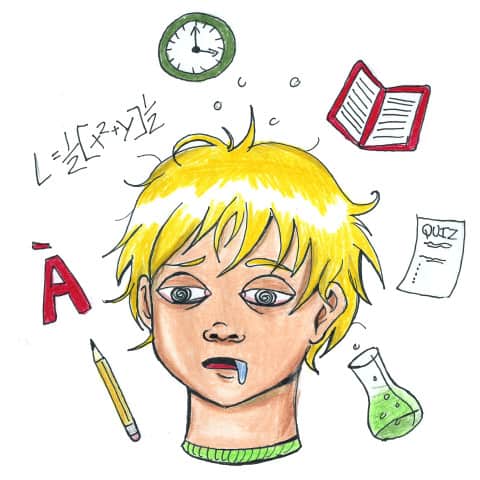ASHLEY BRITZ
To many university students, getting a good night’s sleep seems to be more of a luxury than a necessity. These days, more and more students are abandoning a healthy sleep schedule in order to cram for tests, attend wild parties or binge-watch Netflix.
It is not uncommon for the average student to complain about their lack of sleep, guzzle large amounts of coffee and wander around the campus hazy-eyed and lethargic. Is this common trend of not getting enough sleep at night actually healthy and productive? In my opinion, no.
In order to experience first-hand the effects of sleep deprivation, I decided to pull an almost all-nighter, getting about two and a half hours of sleep precisely before attending my lectures in the morning.
Guess how much fun that was?
One thing that I observed about my sleep deprivation was the utter apathy I felt towards, well, almost everything. My bus being 10 minutes later than usual usually incites some sort of panic in me —  anger, even — yet I barely noticed.
anger, even — yet I barely noticed.
I was too busy letting my eyes focus and refocus on a rather interesting leaf on the sidewalk. I also happened to encounter a rather large spider in a bathroom in the Agriculture Building before my class, and instead of shrieking and stomping on it faster than you can say “phobia,” I was simply indifferent to its existence, too tired to care.
Classes were even worse. Not only did I find it a challenge to stifle the waves of yawning, I also struggled to keep up with the professor and it seemed to me that she was moving about 10 times the normal speed through topics. My notes became scattered and unorganized, and I found myself having to get my professor to repeat things for me in order for my clouded brain to comprehend the topics being discussed.
My focus on the material was blocked by the constant cloud of drowsiness, paired with vivid fantasies of a soft, warm bed replacing the plastic chair I was sitting on.
Unfortunately, such a fantasy was sadly out of my reach at this time.
The bottom line is that sleep deprivation is not good for you mentally or physically. It prevents you from focusing properly in class, therefore possibly leading to a downfall in grades. According to WebMD, not getting the right amount of sleep at night can lead to depression, forgetfulness, weight gain, impairment of judgement and even skin aging.
In addition, when you regularly deprive yourself of sleep, your body begins to adjust to it and you begin to feel used to the amount of sleep you are getting, even if it’s not a healthy amount. This basically creates a false sense of restfulness, when in truth, you are still suffering from the negative side effects of a lack of sleep.
I can understand having the occasional night where an eight hour cram session is essential to get that paper finished, or if you just really need to let loose and go out with your friends for the night. But my advice is to keep these occurrences to a minimum.
Plan your schedule accordingly to accommodate times for homework and leisure. Don’t eat heavy foods before bed. Stay off your phone, tablet and computer before bed and pick up a book instead. Try to get around eight hours of sleep a night.
Your body, mind and sanity will thank you graciously.
—
Image: Ashley Britz
Leave a Reply